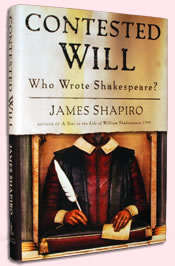The Necessary Life Experience
to be Shakespeare
 Contested Will: Who Wrote Shakespeare?
Contested Will: Who Wrote Shakespeare?
James Shapiro (Simon & Schuster, 2010)
Forgive me, people, for I have sinned. On one of the myriad cable channels that broadcast pseudo-documentaries about amusement parks, you may have seen me, then publisher of The Loop online newsletter, describe Ocean Park in Hong Kong, including details about experiencing some of the rides. However, I have never been to Hong Kong. On the eve of the interview when I had been told the questions would include Ocean Park, among others, I called a friend who worked there. She talked me through the park and its rides, including geographical and cultural contexts. Yes, this was a shameless breach of journalism ethics, but I explained it away (to myself) by noting that all of these documentaries I've appeared in stray to some degree from real-life to more-dramatic-life. Still, I stand guilty of hypocrisy, at least.
I come clean here and now because it is relevant to a key point James Shapiro makes in his well-researched, fun-reading Contested Will: Who Wrote Shakespeare? Those who insist “a Stratford glover's son” could not have had the life experience “evident” in the plays and necessary to write them overlook the capacity for anybody to attain information necessary to adequately—if not genuinely—portray such experiences (even Shakespeare's contemporary Ben Jonson attested to the fact that his rival's grasp of geography was certainly not that of a man who had been to the places he was portraying).
The anti-Shakespearean adherents also regard Shakespeare as “merely an actor”; Shapiro offers a more proper perspective on Shakespeare's primary profession. “What I find most disheartening about the claim that Shakespeare of Stratford lacked the life experience to have written the plays is that it diminishes the very thing that makes him so exceptional: his imagination,” Shapiro writes. “As an aspiring actor, Shakespeare must have displayed a talent for imagining himself as any number of characters onstage. When he turned to writing, he demonstrated an even more powerful imaginative capacity.”
Over the past 200 years (but not during the first 200 years after his death, Shapiro points out) Shakespeare's authorship of the plays and poetry attributed to him has been called into question, to the point that a noticeably large portion of the public today firmly believe the Stratford man did not do the actual writing. Hollywood has even gotten into the fray with the upcoming movie Anonymous advancing the theory that Edward de Vere, the 17th Earl of Oxford, wrote the plays as part of a royal cover-up. In the face of such claims, Shakespearean scholars have tended only to scoff that such theories have no basis in fact. Meanwhile, the theories take stronger root, especially in the more egalitarian scholarship venue that is the Web and in a time when even with overwhelming documentation people doubt everything from the Holocaust to the birth of the president.
With Contested Will, Shapiro aims to bring real scholarship to the question. While he concludes the book with a well-cited case for William Shakespeare as the true author, he spends the bulk of his focus on the various authorship theories, primarily the Oxfordian and Baconian camps, the latter espousing Francis Bacon as “Shakespeare.” Shapiro delves into the people who originated these theories and the revered people (Mark Twain, Sigmund Freud) who advanced them. He details not only their arguments but also, importantly, the contexts of their reasoning.
Shapiro summarizes in a sentence that, on its surface, is disturbing for a web site dedicated to Shakespeare's 21st century relevance: “… Shakespeare is not our contemporary, nor as universal as we might wish him to be.” Rather, Shakespeare wrote for a specific time, place, and purpose. Each succeeding century takes us further away from his specific context, yet each succeeding society tries to view his life in its own particular context. Thus, the Victorians were certain that a writer of such a “noble mind” could not have written solely for a commercial enterprise; but up until 1800 that is the only reason anybody published their writings. By the time of the 20th century, critics believed that the plays and especially the sonnets were autobiographical; however, Shapiro exhibits how the notion of autobiography, both fictional and factual and even poetical, did not emerge until the early 1800s.
The plays' authorship first came into question because, as Shakespeare's status was elevated to that of a deity by the end of the 18th century, the historical record of the man was sparse, and portrayed only that of a businessman and greedy money-lender. Because the Victorians could not reconcile the man who wrote the plays with the man of record, it was inevitable that the two sides of Shakespeare would soon become two different people. Since then, the historical record has further fleshed out Shakespeare the man, and Shapiro especially details recorded evidence of Shakespeare's stature—as a man and as a playwright—among his peers.
Not that such evidence matters to those who don't believe Shakespeare wrote what Shakespeare wrote. The only evidence the Baconians, Oxfordians, Marlovians, and all the other ians put forth to support their claims they find in the works themselves. It's not so much warped thinking as applicable thinking, as in the evidence that applies here doesn't apply there. For example, the Baconians saw Shakespeare's self-portrayal as Prospero, ignoring that character's often-despotic behavior. The Oxfordians saw Shakespeare revealing his true self as Hamlet without commenting on that character's callousness. Does it follow that we should then see Shakespeare as Titus Andronicus or maybe Macbeth? Funny that nobody seems to see Shakespeare in his most profuse creation, Falstaff. I would also nominate Horatio, the observer and reporter who turns frustratingly enigmatic right at the point—after the Mousetrap—when clarity is most needed.
As learnéd as Contested Will is, Shapiro's writing is casual and fun (in recounting the Baconians' attempts to decode the plays, Shapiro points out that the first person to interpret a Shakespearean anagram to suit his own needs was Malvolio in Twelfth Night). Though he's tackling a serious subject, Shapiro in his narrative and by the subject's very nature sometimes devolves into silliness on the level of the Knights who say “Nee.”
Because Shapiro hews to a scholar's trail, he only hints at what I believe is the bottom-line cause for the authorship debate: snobbery. People claim that the “illiterate son of a glover in a provincial town” could not have written the greatest masterpieces of the English language, even though Shakespeare was, in fact, a well-educated son of a community leader in a market town at what was then England's geographical center and cultural crossroad.
Thus, when Mark Twain, my favorite American writer, contends that Shakespeare's upbringing and life experiences were not sufficient enough for the author of those plays, my only response to Mr. Clemens is to warn him that 200 years from now, people will question how some yahoo from Hannibal, Missouri, with no formal education beyond elementary school could have had the intellect to write something as multilayered and complex as Huckleberry Finn or the life experience to write The Prince and The Pauper or A Connecticut Yankee in King Arthur's Court. This will then lead people to find cyphers in Mark Twain's works that clearly point to Theodore Roosevelt as the true author, giving rise to Teddians.
Eric Minton
May 5, 2011
Comment: e-mail editorial@shakespeareances.com
Start a discussion in the Bardroom



 Find additional Shakespeareances
Find additional Shakespeareances